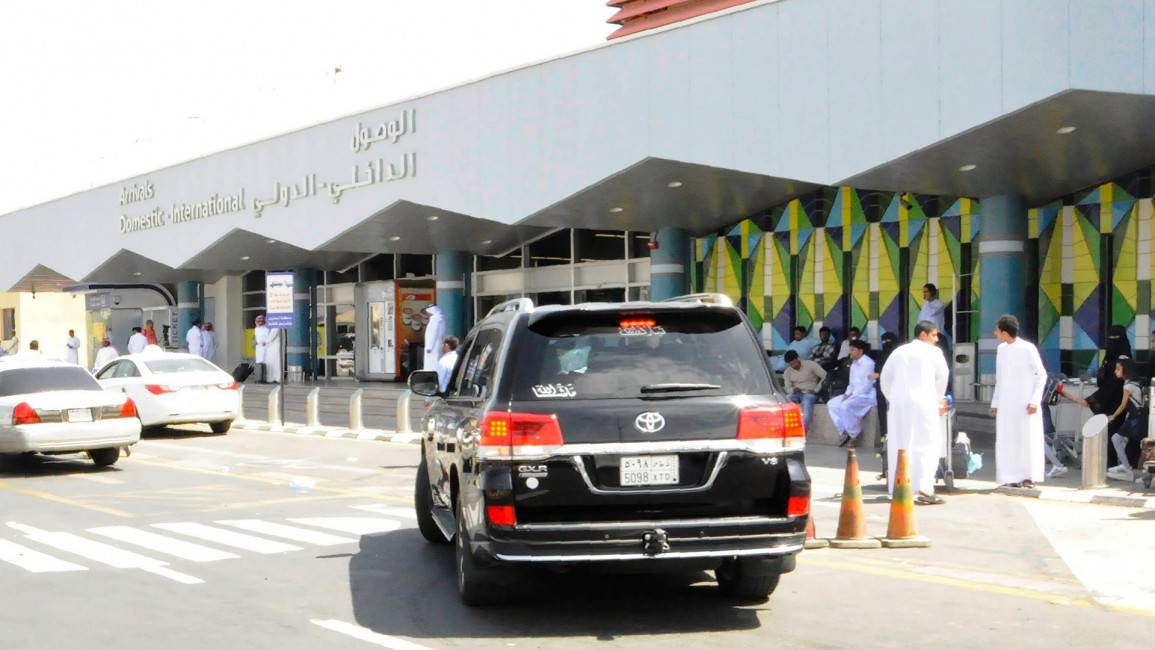Houthis claim responsibility for Saudi airport attack which caused plane to catch fire
Yemen’s Houthi rebels on Wednesday targeted an airport in southwestern Saudi Arabia causing a civilian plane on the tarmac to catch fire, the kingdom's state television reported, an attack that threatens to escalate Yemen's grinding war.
Firefighters brought the blaze at Abha airport under control, Saudi state-owned Al-Ekhbariya TV said, without reporting on possible casualties from the assault. Saudi officials did not immediately respond to requests for comment.
The Iran-backed Houthis claimed responsibility for the attack soon afterward, with military spokesman Yahia Sarie saying the group used four bomb-laden drones to target the airport.
“This targeting comes in response to the continued aerial bombardment and the brutal siege on our country,” Sarie said, stressing that the Houthis consider the airport a military not civilian target.
Col. Turki al-Maliki, the spokesman for the Saudi-led military coalition fighting in Yemen, said the forces intercepted and destroyed two of the four bomb-laden drones launched by Houthis toward the country's south. He condemned the assault as a “systematic and deliberate attempt to target civilians."
Read more: Why Biden’s pledges to 'end' involvement in the Yemen war are not enough
Since 2015, Yemen’s Houthis have repeatedly targeted international airports in their battle with the Saudi-led coalition, along with military installations and critical oil infrastructure, within Saudi Arabia. The Houthis have long used drones against Saudi Arabia, sometimes crashing them into the kingdom’s Patriot missile batteries. Those attacks, often striking near the southern cities of Abha and Jizan, have wounded dozens and killed at least one person over recent years.
A Saudi-led Arab coalition intervened in Yemen on behalf of the internationally recognized government of President Abed Rabbo Mansour Hadi in early 2015, following the Houthis seizure of the Yemeni capital Sana’a. The war has devastated the impoverished country and spawned the world’s worst humanitarian disaster.
Twitter Post
|
In November 2017, the Houthis even reached Riyadh’s international airport, deep inside the kingdom. No one was hurt in the attack, which marked the first time that a Houthi missile had come so close to a heavily populated centre. Riyadh is around 1,000 kilometres north of the border with Yemen.
Saudi officials have blamed Iran for providing ballistic missiles to the Houthis used in such attacks. Tehran denies arming to the Houthis, despite evidence to the contrary.
The attack late Wednesday afternoon marked the first to impact a civilian aircraft at the facility, although the extent of the damage remains unclear. Flight-tracking websites showed delayed and cancelled flights scheduled to either take off or land at the airport. Flights at Abha airport resumed some time after the attack.
At least two Airbus A320s flown by Saudia, the kingdom’s flagship carrier, were on the tarmac at Abha on Wednesday afternoon, according to the flight-tracking website FlightRadar24.com. Another Airbus A320 on the ground belonged to low-cost carrier FlyADeal. The airlines did not immediately respond to requests for comment.
The US Air Force’s Central Command, based at Al-Udeid Air Base in neighboring Qatar, declined Associated Press requests for comment.
As recently as late January, U.S. forces stationed at Prince Sultan Air Base near Riyadh trained Saudi troops on how to counter the threat posed by drones, which can fly low to the ground, evade radar and detonate against targets in the kingdom.
President Joe Biden has recently turned a spotlight on the brutal war in Yemen, declaring last week that the United States would end its support of the Saudi-led military offensive, including “relevant” arms sales. The administration has also moved to lift former US President Donald Trump’s designation of the Houthis as a terrorist designation, citing the need to mitigate Yemen's humanitarian crisis.
But Biden stressed that the US would continue to help Saudi Arabia defend itself against outside attacks, as part of maintaining key security, counterterrorism and military ties with the kingdom.
Follow us on Facebook, Twitter and Instagram to stay connected


![Minnesota Tim Walz is working to court Muslim voters. [Getty]](/sites/default/files/styles/image_684x385/public/2169747529.jpeg?h=a5f2f23a&itok=b63Wif2V)




![Israeli officials are considering exiling Yahya Sinwar to Sudan as part of a deal to end the war [Getty]](/sites/default/files/styles/image_330x185/public/1251837582.jpeg?h=127ba027&itok=ujxSRy_f)
![Debris near Rafic Hariri International Airport [Getty]](/sites/default/files/styles/image_330x185/public/2176162423.jpeg?h=a5f2f23a&itok=MCSK9mkM)
![An Israeli air strike on Jabalia killed teenage journalist Hassan Hamad [Screengrab/X]](/sites/default/files/styles/image_330x185/public/2024-10/hassan%20hamad1.jpg?h=c12e0b96&itok=Rd_dyCVp)